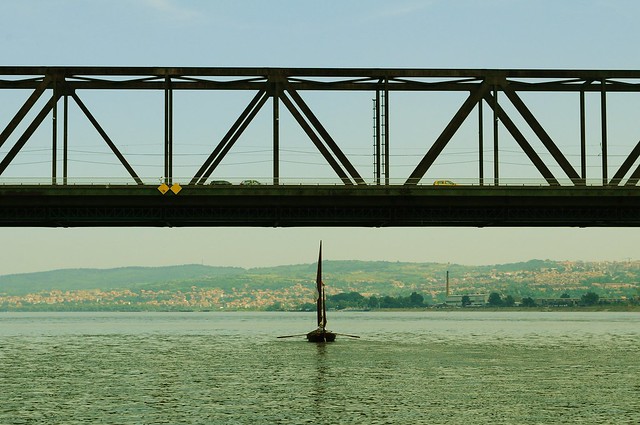
Sometimes, at the end of the road we can’t find a nice little house where we can take a rest. It just happens that the road ends, and this is it.
From the train taking me back to Novi Sad, I saw a road that found its termination on a half built bridge. I thought to all the travels and lives of the world. Sometimes they just end like that road, suspended.
I keep going: So far, thank Bagawan, I’m still alive and kicking. Now I also own a little medal blessed by Benedict, that the papal nuncio in Serbia (met in the Italian Embassy in Belgrade, where Andrea Arnaldo kindly organised a press conference for us) gave me.
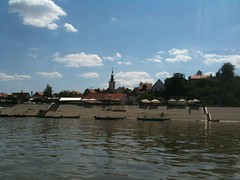 Dobro, super mega dobro, extra dobro, ultra dobro, hyper dobro: For this country, about which people are not often paying compliments, superlatives seem very appropriate to me.
Dobro, super mega dobro, extra dobro, ultra dobro, hyper dobro: For this country, about which people are not often paying compliments, superlatives seem very appropriate to me.
I didn’t know it, but a place that gave 17 emperors to Rome (although I don’t like empires) must have some qualities. I’d love to stay. But for the usual, blind, bureaucratic reasons, I have to go within the 16th of June.
Bureaucracy is the real burden of Serbian people.
But what’s Serbia about? The explanation is not up to me, but I invite you to read the great names of literature and poetry that, far more than historians and geographers, can tell the true essence of a place. To me, Serbia is like the Danube: They’re always trying to fit it in a bottle, it but it keeps coming out, and it’ll always.
Belgrade is beautiful and Zemun has won a place in my heart. Despite 78 bombings, despite bad architects and builders (the ugliest city in the most beautiful place, according to Le Corbusier). But you can’t judge a city by a handful of horrible buildings. If that would be the casa, we should shut down many place in Italy: just think of some architecture in Rome, Milan or Turin.
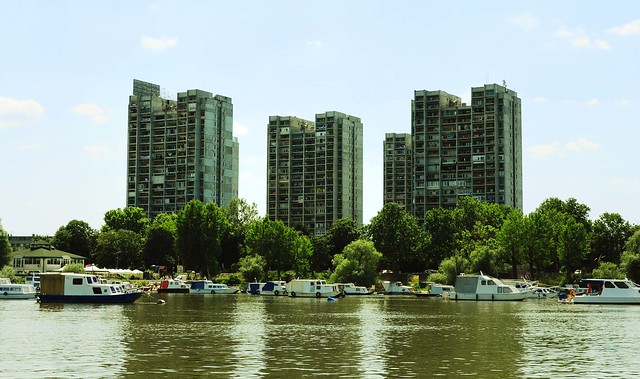
Sava and Danube, not Tevere and Aniene, with all due respect. And the Balkans beginning under a dream fortress.
But let’s get back to where we left: Novi Sad (or rather Novi Happy) goodbye us with a good “cevapcici” dinner organised by our friends from “Marina Dunavac”. Thanks to them and to Nora, who teaches maths and that I’ll contact for our next project, and to her husband.

I set off on July 5th from Novi Sad, tailwind, but the Danube turns and the wind is now hitting my face, just under the fortress. Thanksfully the river decides to take a last turn and, for 47 km, I go fast over the Danube’s rollers. At 1 pm I decide to stop because I’m navigating at 13 km/h without any sail raised, and the rollers are growing stronger.
I spot a little harbour with a small restaurant, so I head there. Getting backwards, even if only for a few metres, is not easy, however I manage to make it and I find hospitality. A little earlier, under the Danube’s tallest bridge, I had seen a lot of plastic bottles possibly littered by some passing ship. I hope that life will take care of these people, if there’s a justice.
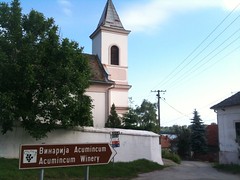 Slankamen was an old Roman fort, still there and awesome, despite it’s now in ruins. Aquinicum. Waters, so important for Romans. The legionnaires were healed here, thanks to a hot salted spring: A luxury for rough soldiers, and many of them settled here. In fact it’s full of vineyards.
Slankamen was an old Roman fort, still there and awesome, despite it’s now in ruins. Aquinicum. Waters, so important for Romans. The legionnaires were healed here, thanks to a hot salted spring: A luxury for rough soldiers, and many of them settled here. In fact it’s full of vineyards.
The lands given to the Roman legionnaires were a sentence to sedentary life, in order to colonise the empire. They planted vines, needing four years before giving good results. However, this is a fair place to live, near the confluence between Tisza and Danube: Hills and fresh air.
Slankamen has 300 inhabitants: They live well, waiting for a tourism that will possibly ruin everything as often happens.

In Mika Alas restaurant (Alas means “fisherman”) we have a nice lunch, hear wonderful music and meet Oliver, whose work is in buying and restoring old train wagons. He comes to see the boat, so we get to know him.
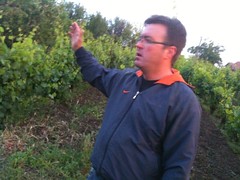 After a coffe, he takes us in his place, nestled over a hill with a view spanning from Hungary to Romania. Many plants and vines: His wine (pinot noir, sauvignon, tokaj) is quite good. The three components for an excellent wine are here: Terrain, vines and man.
After a coffe, he takes us in his place, nestled over a hill with a view spanning from Hungary to Romania. Many plants and vines: His wine (pinot noir, sauvignon, tokaj) is quite good. The three components for an excellent wine are here: Terrain, vines and man.
He wants to organise a tourism driven by wine. It might be a way to enhance this nice village, saving it from ice creams and ill-mannered people, that are far worse than barbarians. As those who littered the plastic bottles into the river. Just ill-educated, and always ill-educators too.

We meet many friends. Vedran, Daniela and Sanda who owns a pretty house on the Danube. She speaks a good Italian. We have too much alcohol at dinner and the next morning is hard to wake up at 5, but we manage to make it.
Let’s go toward our 5th capital city. It’s very warm now. We see a superb canyon with some houses built on the cliff. Absurd!
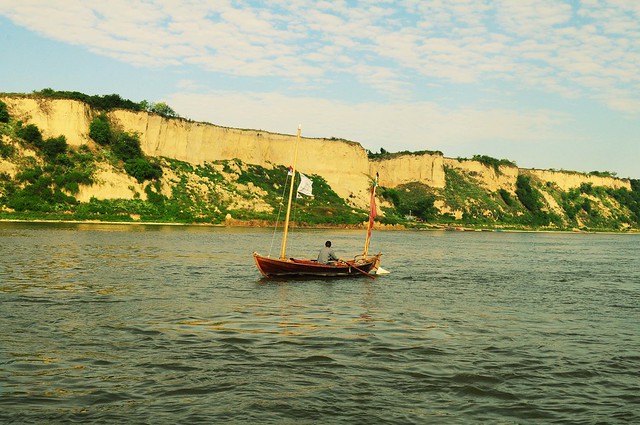
A very hard time today: Many km, hot and cold, hungry mosquitos, many words and energy, but the beauty of this journey overtops everything. After a few too warm hours, the wind comes and we can raise the sails for the last 10 km.
Anna and Leon are refused as lepers by the marina of the rich. A few km back I see a nice old boat and many masts peeping out from behind it.
 We receive a nice hospitality: It’s the Zemun Yacht Club in Zemun, that’s not Belgrade. It looks like being part of it but we’re still in Vojvodina, which means Austro-Hungarian empire. Who’s on this side says that beyond the border live the Balkans, Turks. It’s not said like a compliment.
We receive a nice hospitality: It’s the Zemun Yacht Club in Zemun, that’s not Belgrade. It looks like being part of it but we’re still in Vojvodina, which means Austro-Hungarian empire. Who’s on this side says that beyond the border live the Balkans, Turks. It’s not said like a compliment.
The river here forms a protected bend that used to divide the Hapsburgic empire from that of the Ottomans. Thanks god those empires are gone.
Zemun is still a beautiful city, with nice palaces, despite being a bit humiliated by a few 22-storey buildings that are, however, somehow funny. In Italy they would host a ghetto while in Zemun they’re full of wonderful people living in harmony. As often happens here. Many popcorn and ice cream sellers and other people offering various objects from their own life, to collect a handful of dinars. It’s the only sign that something’s not quite right.
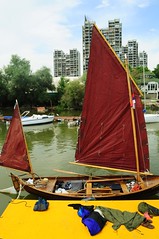 All the rest is healthy and rich: In power, dignity and beauty. I meet Mirko, elegant and kind. Josip, a lucky young man who lives between the Netherlands and Zemun, with an European wage. He owns a microtonner, those very fast boats of 5,5 mt of lenght. Same kind of that of Stefano leon Rodriguez, who traveled without any engine from Bergen to the Northern Cape and back. A Superman endeavour. Stefano would be happy here, there’re seven or eight microtonners around.
All the rest is healthy and rich: In power, dignity and beauty. I meet Mirko, elegant and kind. Josip, a lucky young man who lives between the Netherlands and Zemun, with an European wage. He owns a microtonner, those very fast boats of 5,5 mt of lenght. Same kind of that of Stefano leon Rodriguez, who traveled without any engine from Bergen to the Northern Cape and back. A Superman endeavour. Stefano would be happy here, there’re seven or eight microtonners around.
The Yacht Club lives on members contributions and on some financing to teach sailing to kids. Super dobro! On the first night i have a few beers with Zoran, a big Viking man who was former canoe champion in Tito’s times. Strong and kind. He works as bouncer, but listens to classical music only. Every night he goes to work in a awful disco where thousand of gnats gets struck by the loud sound.
 The next morning, I’m guest of the Italian Embassy where the kind Doctor Andrea Arnaldo summons a few journalists. Thanks to Dragan Petrovic from Ansa and Isotta, who gives me a fantastic guide of the Danube. I like Belgrado a lot. It bears the signs of so much life. As I said, it’s a shame having to go.
The next morning, I’m guest of the Italian Embassy where the kind Doctor Andrea Arnaldo summons a few journalists. Thanks to Dragan Petrovic from Ansa and Isotta, who gives me a fantastic guide of the Danube. I like Belgrado a lot. It bears the signs of so much life. As I said, it’s a shame having to go.
I get to know better Josip. His dad is ill: He was a soldier and was punished in war’s time because he refused to shot on Croatians. As many others, Josip is a children of parents from different ethnic groups: His mum is croatian while his dad is Serb. His love for boats comes from his early years lived in Pula.
 He tells me about the war and the hate of Belgrade for Milosevic. And about his student days, when the war had also a funny side. American’s gifts are sometimes not appreciated nor easy to digest, as a bad hamburger.
He tells me about the war and the hate of Belgrade for Milosevic. And about his student days, when the war had also a funny side. American’s gifts are sometimes not appreciated nor easy to digest, as a bad hamburger.
Belgrade lives on water and the two rivers, Sava and Danube, are powerful lovers. Sava and Dunav, Zemun and Beograd. Two couples, two different beauties. Whispering Zemun and yelling Belgrade. I leave from Zemun with my heart full of joy. Emil, microtonner and wife, and Josip, microtonner only, escort us bringing their friendship. Emil gives me a nice t-shirt with written “Ja volim Dunav” (I love Danube), and I really love it! Mirko gives me a card representing St. Nicholas, protector of sailors.
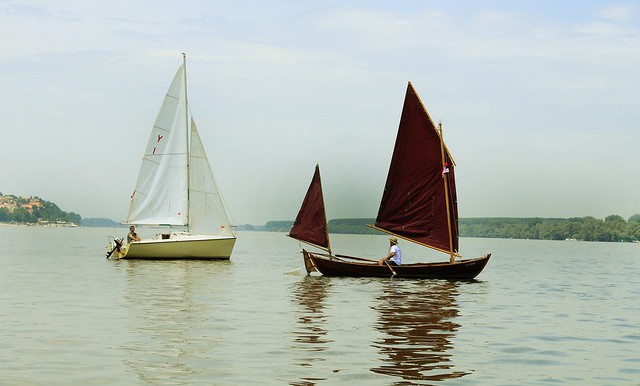
I set sails in good company and happy, but my heart stays behind for a while, moored to a old boat from 1908. And to the safe port that I’ve found, that of friendship.
Hvala.
























It is your special gift to find joy and happiness in a place with so much sorrow. Our collective heart continues to heal.
Perhaps is it best you must go.
You are commended for helping to bring people together of all nationalities, regardless of borders and bureaucracies.
The Black Sea beckons.
Dobro, super mega dobro, extra dobro, ultra dobro, hyper dobro…hahahaha! Great!
Can’t wait form comment from Golubac!
viva la gente dei fiumi, ciao giacomo